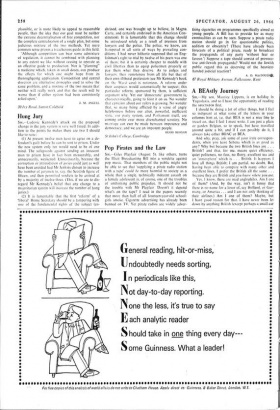Hung Jury
SIR,—Ludovic Kennedy's attack on the proposed change in the jury system is very well timed. In addi- tion to the points he makes there are two I should like to raise:
(1) At present twelve men have to agree on a de- fendant's guilt before he can be sent to prison. Under the new system only ten would need to be of one mind. The safeguards against sending an innocent man to prison have in fact been measurably, and unnecessarily, weakened. Unnecessarily, because the corruption or intimidation of juries could just as well have been avoided had Mr Jenkins chosen to increase the number of jurymen to, say, the Scottish figure of fifteen, and then permitted verdicts to be arrived at by a majority of twelve-three. (This, if we are to dis- regard Mr Kennedy's belief that any change to a majoritarian system will increase the number of hung juries.)
(2) It is lamentable that the first 'reform' of a 'liberal' Home Secretary should be a tampering with one of the fundamental rights of the subject (en- shrined, one was brought up to believe, in Magna Carta, and certainly enshrined in the American Con- stitution). It is lamentable that this change should be introduced solely as a result of pressure from lawyers and the police. The police, we know, are hampered in all sorts of ways by prevailing con- ditions; I had never hitherto supposed that an Eng- lishman's right to trial by twelve of his peers was one of them; but it is certainly cheaper to meddle with civil liberties than to equip policemen properly or pay them what they deserve. As to judges and lawyers. their remoteness from all life but that of their own illiberal profession (see Mr Kennedy's book on the Ward case) is notorious. A reform under their auspicies would automatically be suspect; this particular reform, sponsored by them, is sufficient argument why. Yet our 'democratic' government is, characteristically, going to foist it on us. No wonder that cynicism about our rulers is growing. No wonder that, so many being afflicted by a sense of angry helplessness before our alien, powerful, inefficient state. our party system, and Parliament itself, are coming under ever more disenchanted scrutiny. No marriage can ever be made between impotence and democracy; and we are an impotent people.
HUGH BROGAN
St John's College, Cambridge






























 Previous page
Previous page